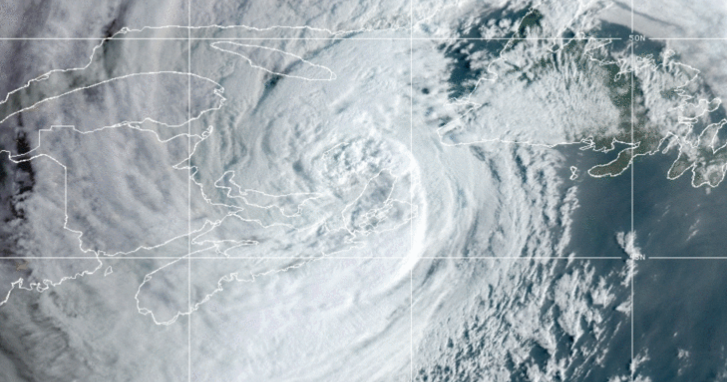FionaIt is a huge and powerful tropical cyclone.
Ocean waves hit the town of Port-au-Basque on Newfoundland’s south coast, sweeping entire buildings out to sea. Mayor Brian Button said via social media on Saturday that people were evacuating to higher ground because the wind knocked over power lines.
“We already had a house…it was washed away,” he said.
Mr. Button said that anyone told to move out must move out. “It’s just a mess,” he said.
The Royal Canadian Police said the town of 4,000 people is in a state of emergency as authorities deal with multiple electrical fires and flooded homes.
Nova Scotia Power’s more than 415,000 customers (approximately 80% of the state of nearly one million people) were affected by the power outage on Saturday morning. He in Prince Edward Island has also lost power to over 82,000 customers, and his NB Power in New Brunswick reports that her 44,329 are without power.
Fiona changed from a hurricane to a tropical storm late Friday, but meteorologists warned that there will still be hurricane-strength winds, which could bring drenching rain and giant waves.
“It was a very strong storm as soon as it made landfall,” said Ian Hubbard, a meteorologist at the Canadian Hurricane Center in Dartmouth, Nova Scotia, Saturday morning. “It continues to make an impact in the region,” he said. .
“The story of the historic storm definitely seems to be becoming true.”
The Canadian Hurricane Center tweeted early Saturday that Fiona had the lowest pressure ever recorded for a storm that made landfall in Canada. Forecasters had warned that he could be one of the most powerful storms to hit the country.
A local state of emergency has been declared by the Cape Breton Municipal Mayor and Council amid widespread power outages, road closures and damage to homes.
“There are houses that have been severely damaged by fallen trees, houses that have been damaged by large old trees, houses that have had their roofs completely peeled off, and houses that have had their windows broken. Cape Breton Municipal Mayor Amanda McDougal told the Associated Press.
“Lots of damage to property and structures, but no human casualties at this time, and we’re still in the middle of this,” she said. Just sitting in my room I feel like the patio door is going to break in a big gust of wind, it’s loud and shocking.”
McDougall said the shelter they opened was full overnight and they plan to open more.
In Cape Breton’s largest city, Sydney, Nova Scotia, about 20 people have taken refuge in the Center 200 sports and entertainment complex, said Christina Ramey, spokeswoman for the region.
Arlene and Robert Graffiro fled to Center 200 with their children after a giant tree fell on their duplex apartment.
Arlene Grafillo, 43, said while her 3- and 10-year-olds were playing, “I heard a lot of noise outside, and I realized there were a lot of cracks in the house. I looked outside and saw a fallen tree.” Waiting room set up by the Red Cross.
“I was locked in and couldn’t open the door or window, so I decided to call 911. The kids were scared.”
The Federal Ministry of Public Security has advised against non-essential car travel.
The fast-moving Fiona landed in Nova Scotia before dawn on Saturday, powering down from Category 4 intensity as it crossed Bermuda early Friday morning, but officials have not reported any serious damage.
Hurricane Watches have been issued for the coastal areas of Nova Scotia, Prince Edward Island and Newfoundland. Storms could bring up to 10 inches of rain in the area. US National Hurricane Center (NHC) added on Saturday that flooding was expected and could be “significant”.
The NHC said Fiona had maximum sustained winds of 85 mph on Saturday. It was traveling across eastern Canada. The hurricane gales extended outward to 115 miles (185 kilometers) from the center, while the tropical storm gales extended outward to 405 miles (650 kilometers).
“Fiona is expected to maintain hurricane strength through this afternoon, although it is expected to taper off over the next few days,” US forecasters said.
Prime Minister Justin Trudeau has decided to postpone his trip to Japan for the funeral of the assassinated former Prime Minister Shinzo Abe.
“Of course, I hope it’s not needed very often, but I think it’s likely,” Trudeau said. “Please listen to the instructions of the local authorities and stay there for the next 24 hours.”
Hurricanes are rare in Canada. One reason is that hurricanes lose their primary source of energy when they reach cold waters. But while tropical storms can still blow hurricane-strength winds, they have cold cores and no visible eyes. It also often loses symmetry and resembles a comma.
https://www.cbsnews.com/news/fiona-knocks-out-power-canada/ Fiona knocks out power and washes up the house in the Canadian Atlantic
